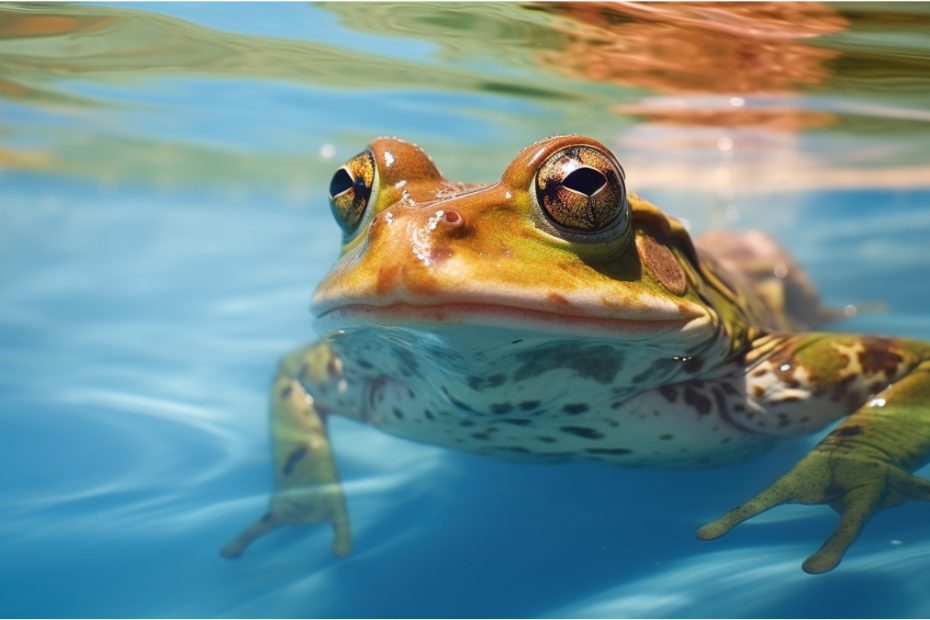Frogs carry Salmonella bacteria, which spreads by direct or indirect contact with the water, tanks, or aquariums they reside in. Also, humans can be affected through excessive exposure to the reptile and amphibian environment. Hence, the last thing you want is frogs hopping in your pool.
Now, how to keep frogs out of the pool effectively? The most effective ways to keep the pool frog-free are:
- Adding a pool fence
- Covering the pool
- Chlorination
- Cleanliness
- Installing water features
- Keeping the lights off
- Ensuring alternative habitats
- Scooping
- Using repellants
- Performing DIYs (that actually work!)
Though we listed the actions, you must know how to perform them successfully. Follow the discussions below throughout the guide; we have attached a detailed “HOW TO” guide.
How to Keep Frogs Out of the Pool? 7 Effective Methods to Use
Except for hassling with the already frog-invaded pool, it is way better to take measures to keep them at bay. The following steps will help keep your pool secured from frog invasion.
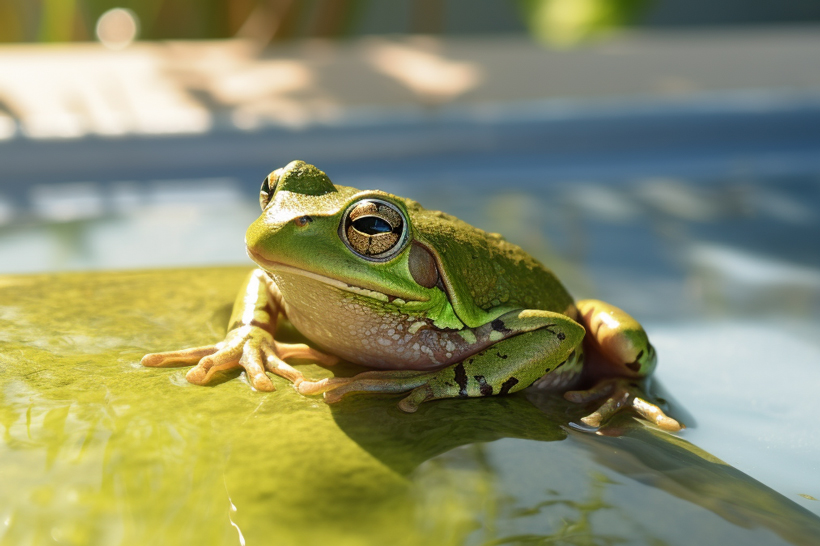
Install A Pool Fence Or Pool Enclosure
Pool fencing is widely famous for keeping the pool intact from frogs. Multiple pool fences are available; mesh fencing among them will work great. These fences come in different heights; some can be up to 10 feet. At least 2 feet of fence height should be considered.
Ensure the mesh fence holes are not more than ½ inches (the lesser, the better). Research states that frogs are less likely to escape from smooth surfaces. Therefore, due to the smooth surface, glass or wood fencing will provide the utmost protection from frog intrusion.
If you want extensive protection, nothing can beat a pool enclosure. It will cover the whole pool and keep it free from insects.
Keep the Water Heated
Frogs tend to be less comfortable in hot water as they contain less dissolved oxygen than in cold water. According to a study published in Biotropica, poison frogs stopped showing righting reflex at 85 degrees Fahrenheit.
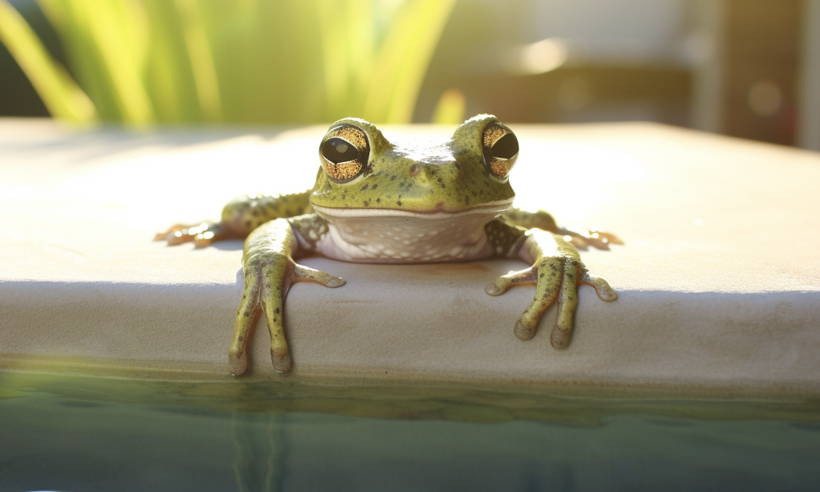
The table below shows the fatal temperature for frogs, according to research.
| Exposure Duration | Fatal Temperature | Non-Fatal Temperature |
|---|---|---|
| 1 hour | 34 Degrees C | 31 Degrees C |
| 2 hours | 32 Degrees C | 30 Degrees C |
| 6.5 hours | 30 Degrees C | 28 Degrees C |
Therefore, frogs generally avoid heated water; even if they end up in your heated pool, they won’t survive for long.
Multiple pool heating options are available, such as electric, gas/ propane, and solar heat pumps. You should buy the best-suited one for yourself. Also, solar pool covers are great for keeping the pool water heated.
Cover Your Pool With A Pool Cover
A pool cover is the best solution to keep frogs and tadpoles out of your pool. There are several types of pool covers; you can have the basic or the fanciest ones. These covers can support more than a hundred pounds; thus, there is no risk of being torn by a frog’s weight.
If you are going away from your home for a long time, a pool cover can be a great savior.
Additional Tip: Your pool cover does not need to ache your pocket anymore if you can simply DIY it. Get any tarp (preferably vinyl material) and place it on the pool. Use weights on the tarp’s corners, and you are good to go.
Turn the Pool Lights Off
None of us will want the pool area to become the picnic spot for the frogs. Nighttime pool lights attract photostatic insects, basically the frogs’ food. Hence, keeping the lights on refers to attracting frogs.
Pro Tip: Insects are less attracted to pinkish, orange, red, and yellowish lights. You can use halogen, sodium vapor, or dichroic lights as alternatives to regular lights.
Water Features to Keep the Water Moving
Frogs prefer unmoving water with steady algae for their ease of hunting and breeding. On the contrary, moving water does not contain many insects and, therefore, no food attraction for the frogs.
To keep the water moving, you can turn on the water pump in your pool. Or you can install different water features such as artificial streams, waterfalls, fountains, or any other movement in the water.
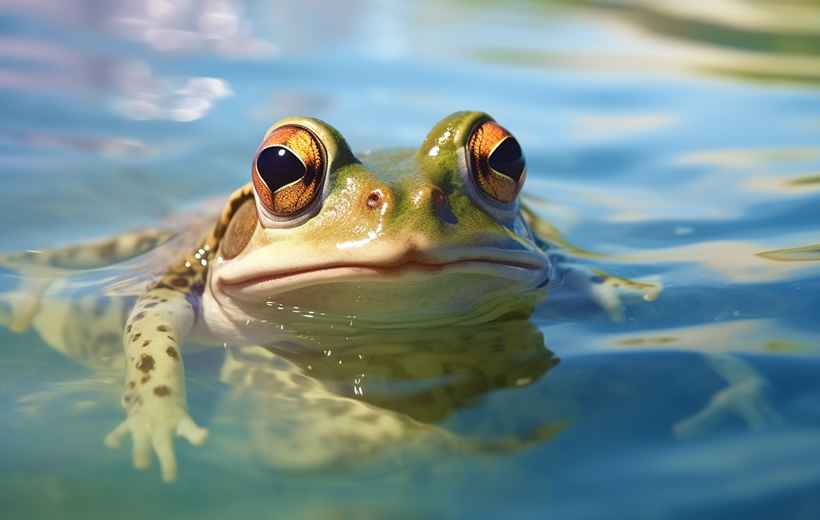
Cleanliness (Both your pool and garden)
Regular pool maintenance will do wonders to prevent frogs from coming near the pool. Clean the dirt and unwanted algae from your pool regularly. Do not forget to chlorinate the water now and then. The last thing frogs want is to get themselves immersed in chlorine water.
The pool’s surroundings are crucial; shrubs and bushes attract frogs and are hiding spots. Any animal rarely jumps into your pool if the surrounding has no unmaintained bushes. Hence, Mow your garden regularly and keep the grasses small.
Make an Alternative Habitat (More Suitable than your pool)
Creating a frog pond will consume little time, but it will effectively attract the frogs, and your pool will be intact. Certain species of frogs and toads need to be preserved. And they come to your pool due to lack of habitation.
Hence, creating an alternative habitat for them will reduce their habitation issue. And at the same time, they will be less attracted to your pool. To create a pond, you can dig your garden or get plastic containers, old bathtubs, wooden barrels, or anything that will hold water.
Remove Frogs From Your Pool: Let’s Float the Floaty Friends Away
Once you see one or two hopping amphibians in your pool, it has now reached the infested stage. Hence, at this point, you must curate how to remove them from your pool.
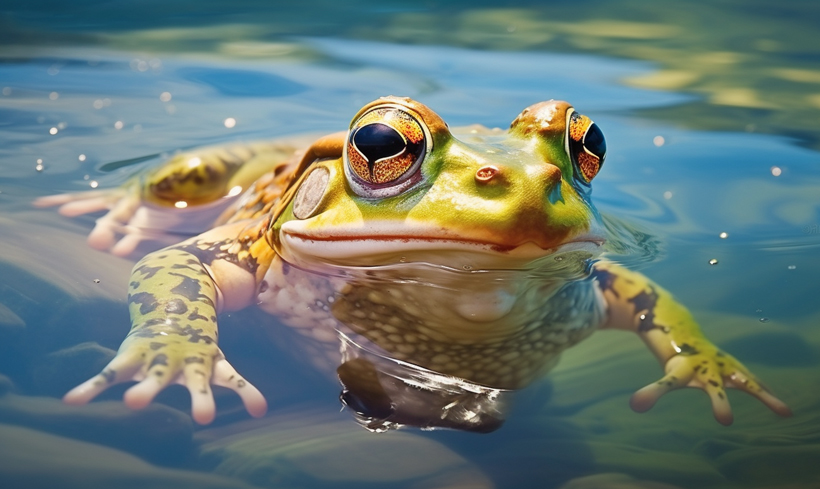
Scoop Them Away
Get a pool skimmer and scoop the frogs away. This is a time-consuming process if your pool is densely populated with frogs. On the other hand, it is very effective if you see just one or two of the amphibian friends.
Hire a Professional Frog Exterminator
Removing frogs can be time-consuming and require extensive effort if your pool is heavily infested. Often, even after doing our best, we may not be able to get rid of them due to lack of experience.
Here comes the professional frog exterminators as our rescue. Get your area’s best frog exterminator team, and you are sorted. They will take all the necessary steps and effectively remove frogs from your pool.
Frog Repellent
Nothing works better than marketed repellants to remove frogs from the garden. These chemical repellents kill frogs and also keep them away from the targeted areas. Use repellents as directed in the packaging.
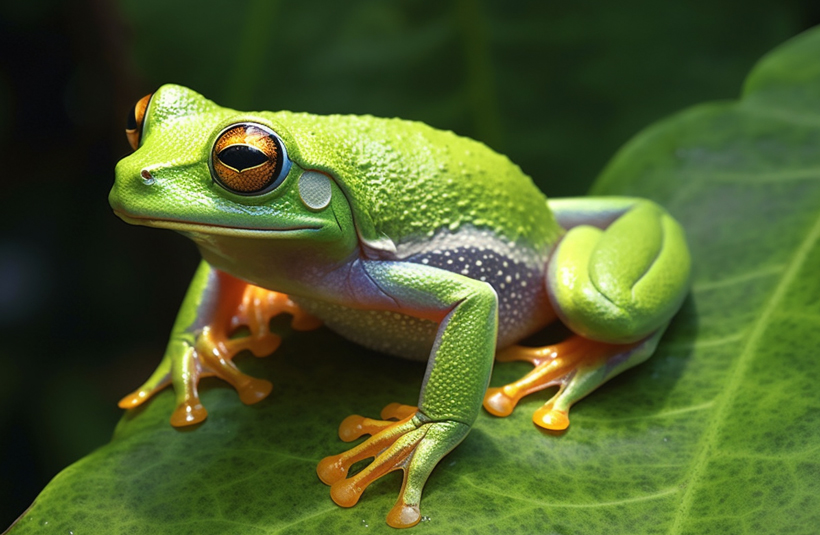
DIY Home Methods
- Coffee: Caffeine is proven to be lethal to frogs. The US Environmental Protection Agency (EPA) legalized caffeine against the infestation of Coqui Frogs. 1% caffeine concentration can be very potent against frogs. Hence, leftover coffee grounds can be effective in repelling frogs from the pool.
- Salt: It dehydrates the frog skin, and frogs exposed to salt water are more vulnerable to diseases (Ranavirus), resulting in less survival chance. Also, saltwater deforms the gender ratio by masculinization of frogs. Sprinkling some salt in the pool and surrounding will prevent frogs from entering.
- Citric Acid: 16% citric acid solution(1.3 lb in 1-gallon water) can be lethal to frogs when sprayed directly. It gets absorbed into the frog’s skin and causes death. You must re-apply the solution within two weeks (the hatching cycle duration) to prevent reoccurrence.
Ramp for frogs to get out
Frogs can neither jump out of the pool on their own nor escape from smooth surfaces. You can install Frog ramps or add pool stairs so the frogs can get out independently.
Why is it important to keep the frogs away from your pool?
Frogs carry salmonella bacteria, which can infect humans. Also, they encourage algae growth, which in your pool is not very pleasant.
Poisonous species like Dendrobates and Phyllobates have alkaloid secretions, which can be lethal if the human mucous membrane comes in direct contact with it. Also, Phyllobates terribilis can cause issues only by rubbing its back.
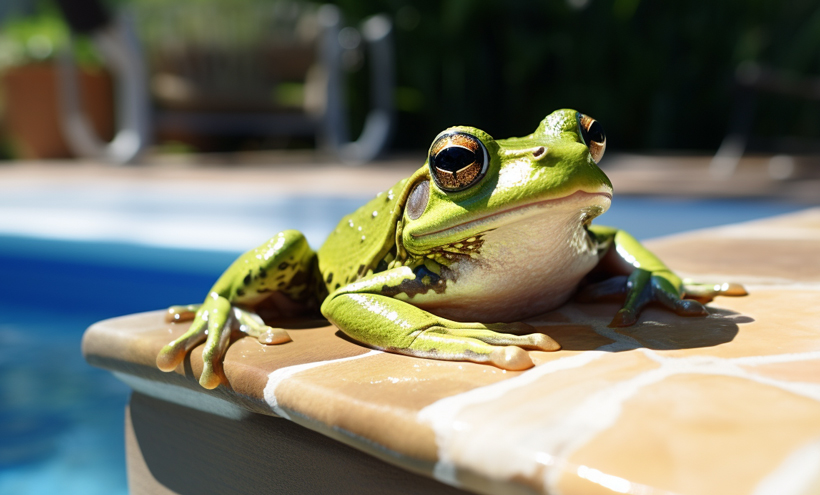
Frogs often encourage the growth of blue-green algae, which can cause GI tract, liver, and vomiting issues in dogs. Some types of blue-green algae can also harm humans (especially children and the old ones).
Coming in contact with, inhaling, or eating them can lead to mild respiratory issues, skin irritation, and hay fever-like symptoms.
Also, Bullfrogs can, if they feel agitated or threatened, bite. However, no reports show any harmful effects from a frog bite. But it can be uncomfortable and frightening.
While pools can sometimes become an accidental haven for frogs, their world is full of surprising interactions and challenges. For example, the question of their diet is ever-evolving, with some unexpected menu choices. Can you imagine that some frogs might even have a taste for reptiles? Dive into our article to learn more about the intriguing question: Do frogs eat snakes?. On the flip side, these amphibians can sometimes become an item of interest for our household pets. If you’re a dog owner, you might be concerned about potential encounters. Discover the implications and what to do if your dog ate a frog in our detailed guide.Related Questions
After reading all the methods to keep frogs away, you may still have some questions in your mind. Here are some frequently asked questions related to keeping frogs out of the pool.
Frogs are attracted to your pool in search of food. The pool might be a food heaven for frogs. Hence, keeping the pool clean and free from insects is very important to keep the frogs away.
The best way is to get a pool skimmer and carefully skim the eggs. If you want, you can relocate them. Also, applying some salt can help decay the growth of the larvae stage.
Conclusion
Warding off the frogs from your pool actually depends on which condition your pool is in. Whether it is in the infected or infested stage.
The most efficient steps are keeping your pool and surroundings tidy, fencing, chlorination, and pool covers. Also, DIY repellants will do the rest. Still, if you hear the croaks, hire a professional frog exterminator.

Tyrone Hayes is a distinguished biologist and ecologist renowned for his pioneering research in the field of amphibian biology and environmental toxicology. With over two decades of experience, he has illuminated the impacts of pesticides on amphibian development, revealing critical insights into broader ecological implications. Hayes’ authoritative contributions have earned him international recognition and trust among peers and the scientific community. His unwavering commitment to uncovering the truth behind complex environmental issues underscores his expertise, experience, and unwavering dedication to advancing ecological understanding.
